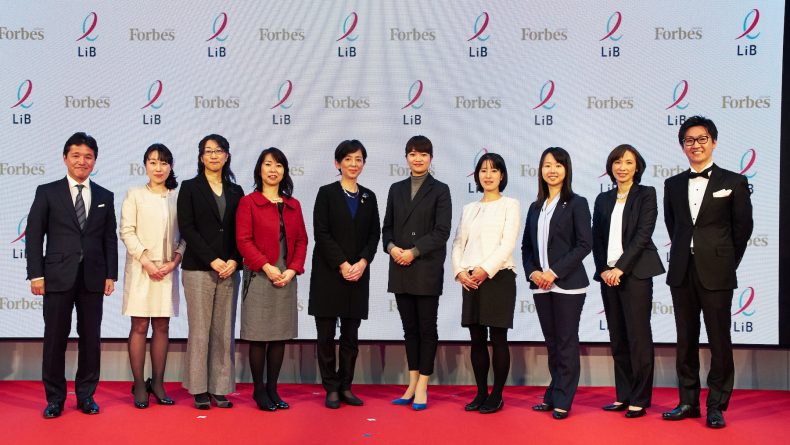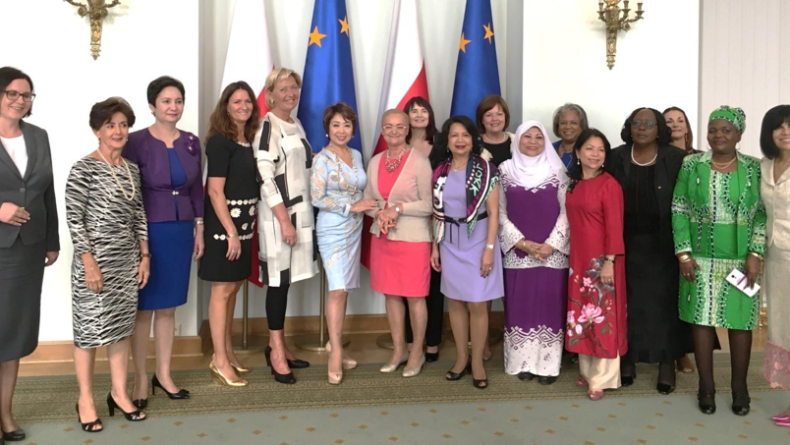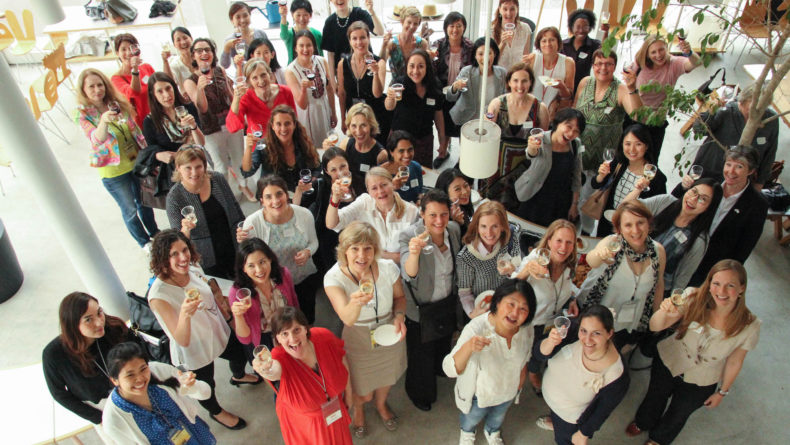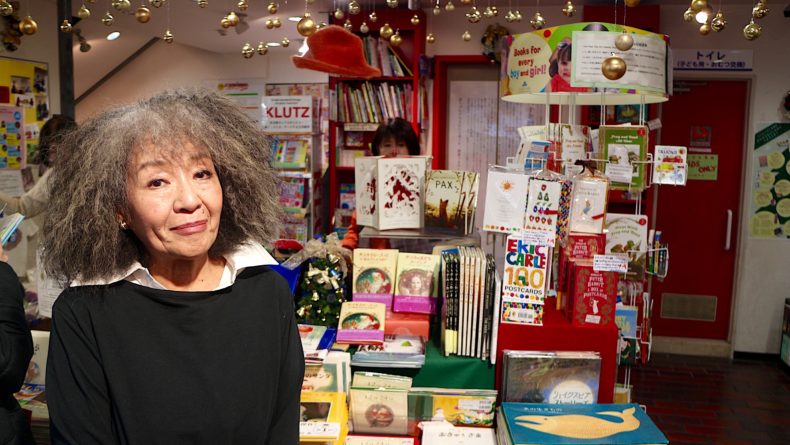Event Report: Global Summit Of Women 2017
The Significance & Highlights Of The Country's First Global Women Summit
The summit showed Japan that the world is watching its next steps.
The three-day international women empowerment forum, Global Summit of Women, which gathered a record attendance of 1,300 women from across the globe in Tokyo from May 11, ended on Saturday, highlighting global — and Japan’s — efforts to close gender gaps in the economic sector and improve women’s roles in leadership positions.
The event brought ministers, CEOs, business women and men from over 60 countries in the largest gathering to date since its launch in 1990, and through various discussions provided hands-on tips of what countries need to do to empower its women population. Here are the highlights of the event as the Savvy Tokyo team observed.
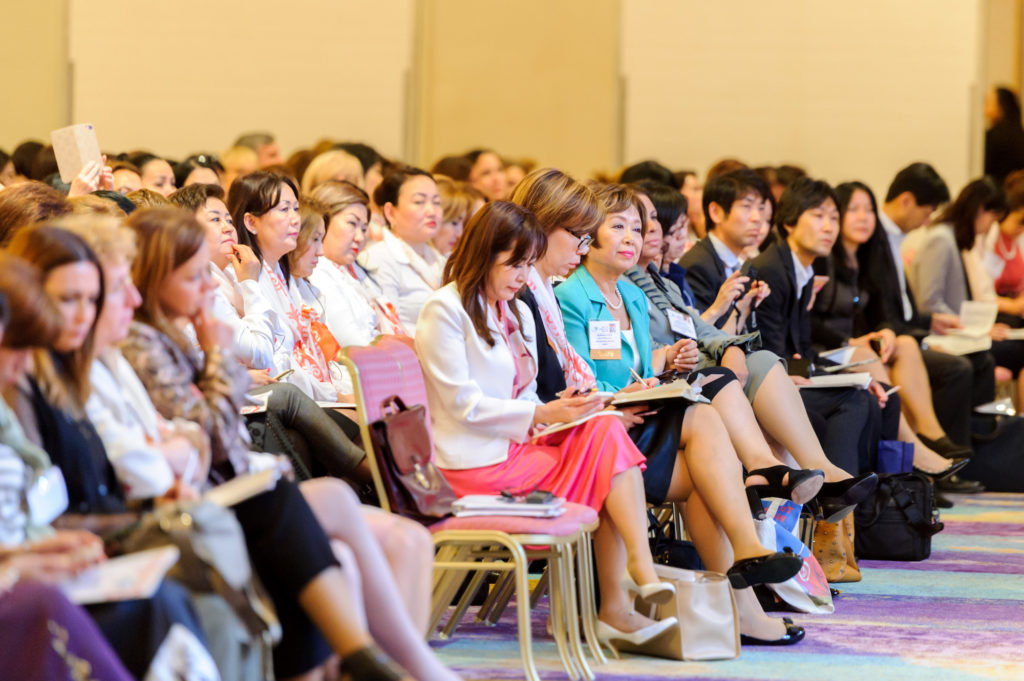 © Photo by LIFE.14 K.K.
© Photo by LIFE.14 K.K.Members of the Global Summit of Women’s Tokyo host committee and participants listen to a panel discussion during the event, which was held in Tokyo from May 11 through May 13, 2017. | Photo by LIFE.14 K.K.
Spotlight On Japan
For the good and the bad, the event put Japan and its government in the spotlight, reminding the country that the world is watching its next steps. The largest in the summit’s history of 27 years, the Tokyo event gathered over 300 extra participants since last year when it was held in Poland. The Tokyo host committee, led by Noriko Nakamura, the CEO of babysitting company Poppins Inc., made an extra effort to introduce Japan’s culture to all guest in its best light, while also presenting the reality of the country’s pressing issues concerning women, and offered a place for discussions on their solutions.
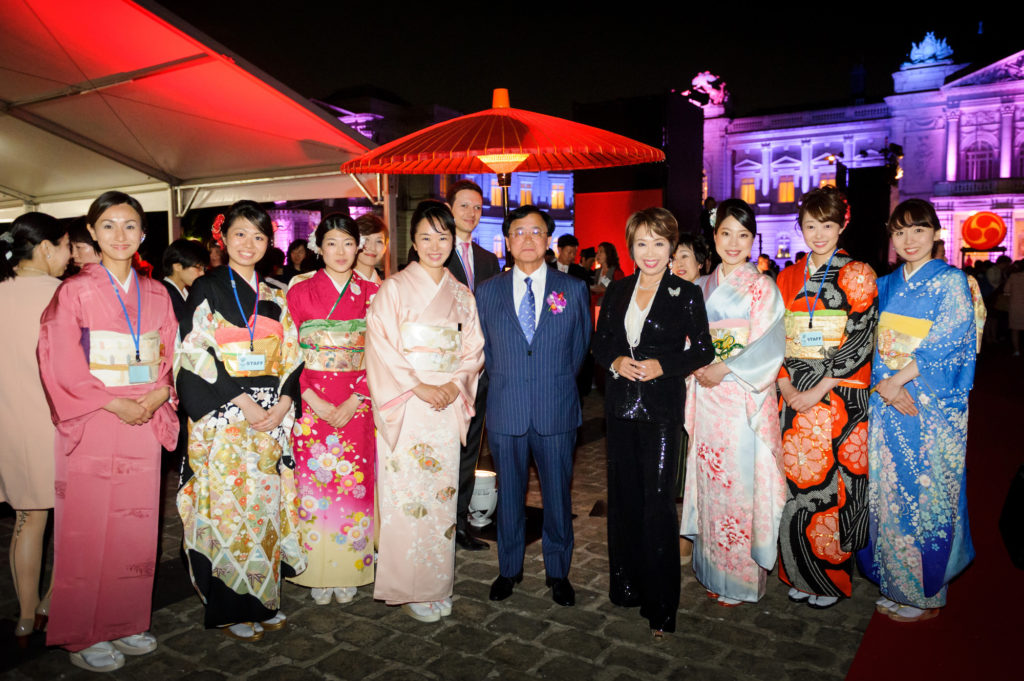
Noriko Nakamura (fourth from left), the chair of Global Summit of Women’S Tokyo host committee welcomes guests at the State Guest House (Geihinkan), lit-up in various colors exclusively for the event, on May 11, the first day of the summit. | Photo by LIFE.14 K.K.
On the first day of the event, guests were welcomed to the State Guest House (Geihinkan) in Akasaka, an enormous achievement on the side of the Tokyo organizing committee. Geihinkan is an exclusive place where non-state organized events are rarely welcomed. “The fact that we could welcome everyone there means a lot for Japan,” Nakamura told Savvy in an exclusive interview, clarifying that this signifies that the summit was supported on a governmental level — even though it took over nine months for the committee to receive a concrete “yes.”
The gathering was a success — it introduced Japanese culture through kimono trials, taiko drum performances and Japanese food and contributed to a quick boost of interest in the Japanese culture. “We had several ministers and company leaders who already started making connections, calling for an introduction of Japanese culture in their countries,” Nakamura said. “As a hosting committee, we were happy to see this happening.”

A powerful taiko drums performance welcomed Global Summit of Women guests to the Guest State House on May 11, 2017. | Photo by LIFE.14 K.K.
By doing this, the Tokyo committee — which included politicians, company, and university presidents — sent a very clear message to the government: “One of the three main reasons why I took the position as a chair of the Japan host committee is to make sure that this summit serves as a catalyst for the prime minister’s achievement of his (women empowerment) policy,” Nakamura said, referring to Abe’s goal of boosting women (Japanese and non-Japanese domestic employees) in managerial positions to up to 30% by 2020.
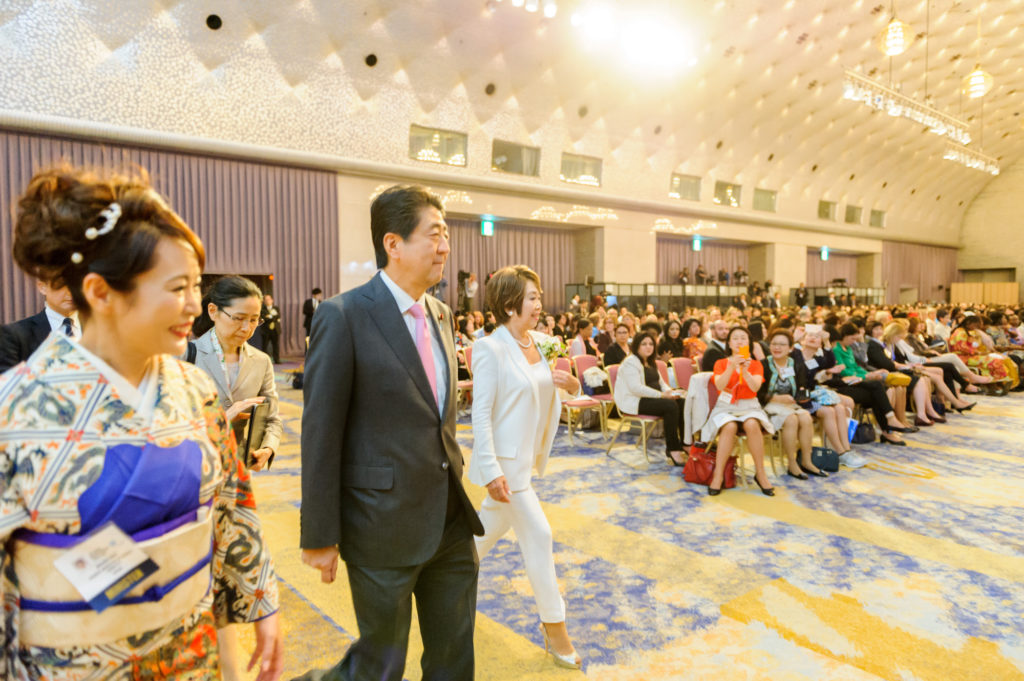 © Photo by LIFE.14 K.K.
© Photo by LIFE.14 K.K.Prime Minister Shinzo Abe walks alongside Noriko Nakamura, right, the chair of Global Summit of Women’s Tokyo Host Committee, and Masako Mori, left, former Minister of Gender Equality and a vice chair of the Tokyo Host Committee, prior to the acceptance of his Global Women’s Leadership Award on May 11, 2017. | Photo by LIFE.14 K.K.
Earlier on that day, Abe was awarded the summit’s Global Women’s Leadership Award, an event that to many living in Japan came as a surprise (as he is better known of being a speaker rather than a doer when it comes to women’s empowerment). But to the crowd listening (and hopefully to his cabinet), the award serves as a reminder that his so-much talked about “Womenomics” is still to be implemented and he needs to start addressing the issue right away.
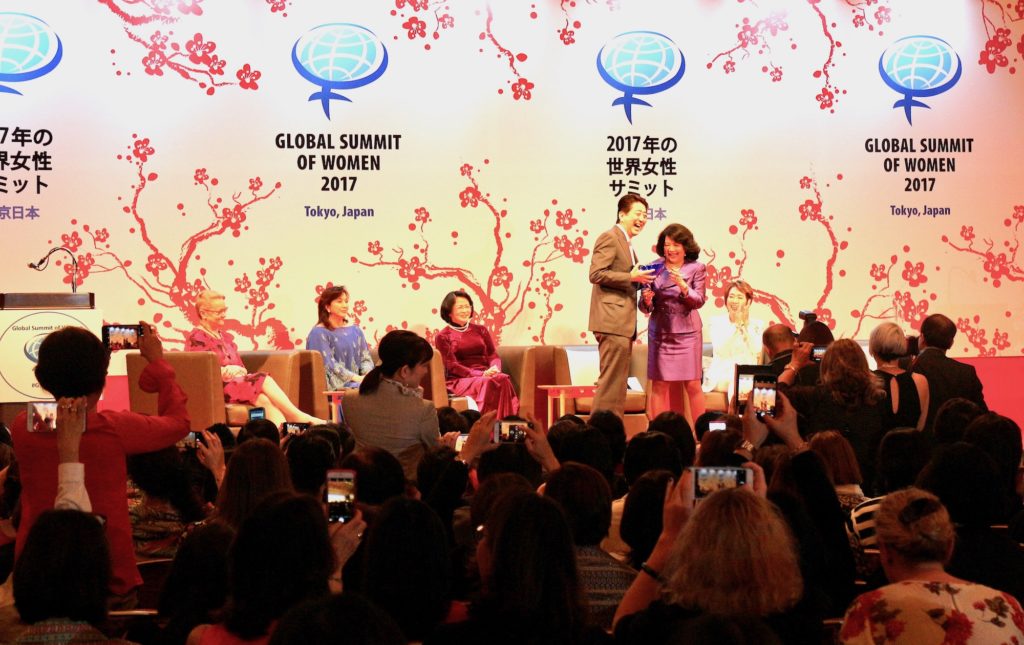
Prime Minister Shinzo Abe accepts the summit’s Global Women’s Leadership Award.
Japan In Numbers: Still A Disappointing Reality
In 2016, Japan was ranked 111th in the World Economic Forum’s 2016 Global Gender Gap index, in what Tokyo Governor Yuriko Koike referred to as “a shameful result” at a speech during the event. It was also ranked 165th out of 190 countries on the World Classification of Women in Parliaments index as of March 2017. Abe, who likes to say that he wants to make Japan “a country where women shine,” has only three women ministers out of 20 and one state minister out of 25. On a capital level, there are only 25 of 127 seats taken by women in the Tokyo Metropolitan Assembly as of present — an issue that governor Koike has vowed to change by appointing as many women as possible in the next Tokyo assembly election in July.
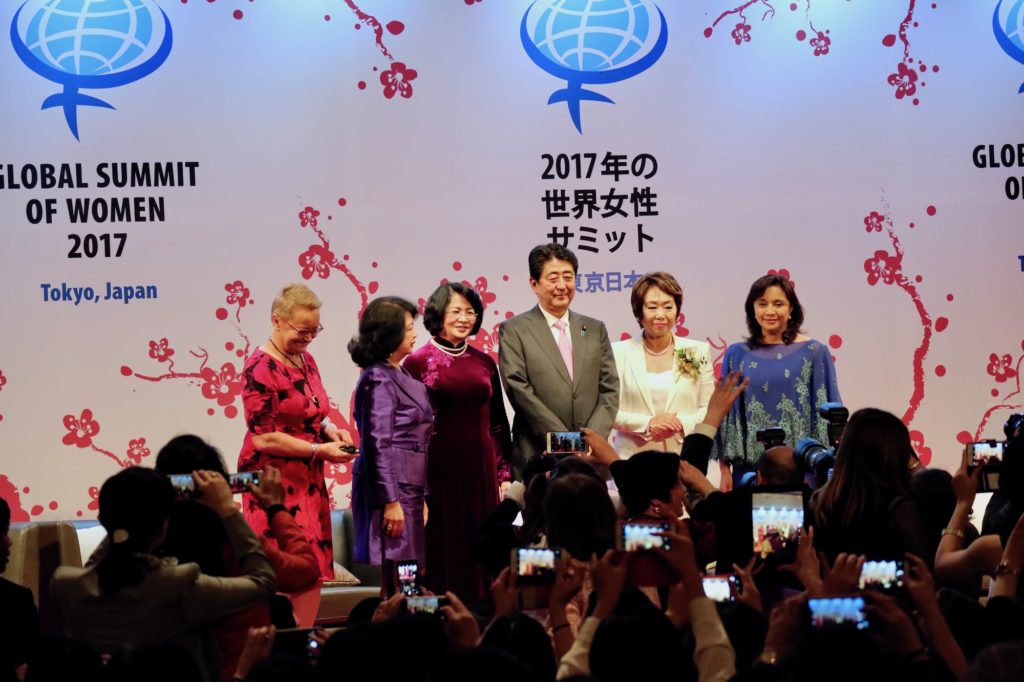
The summit serves as a reminder for Prime Minister Abe that his policies need to be implemented and the world is watching his actions. From left to right are: Henryka Bochniarz, president of the Polish Confederation of Employment and chair of the 2016 Summit in Poland, Irene Natividad, president of the Global Summit of Women, Dang Thi Ngoc Thinh, vice president of Vietnam, Japanese Prime Minister Shinzo Abe, Noriko Nakamura, chair of the Global Summit of Women in Tokyo, and Leni Robredo, vice president of the Philippines.
The data is far from being rosy. According to a recent survey by the Yomiuri Shimbun, as of April 2017, the number of women in managerial positions in the leading 116 Japanese firms that answered the survey stood at 8.3%, a slow rise from the 7.5% in 2016 in the same survey. Another survey conducted by Teikoku Databank in August 2016 on 10,285 nationwide companies in July 2016, showed that women in managerial positions stood at an average of 6.6%, a slight increase of only 0.2% from the previous year. The results in both surveys are still a far cry from the 30% that Abe promises to enforce. That is why we believe that he was called up on that stage to receive an award — not for something he has done, but as a strong reminder of what he has yet to do.
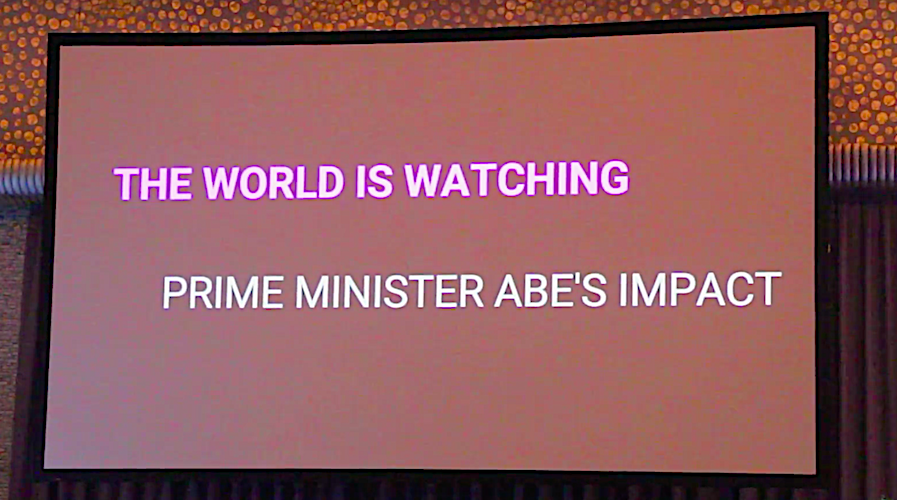
The World Is Watching: A screenshot of the video introducing Prime Minister Abe’s policy to boost women’s participation in leadership roles by 30% by 2020, which was shown to the audience prior to presenting Abe the Global Leadership Award.
Awards And Recognitions
Apart from Abe, two other influential leaders were awarded during the summit: Tokyo Governor Yuriko Koike received the Japan Women’s Leadership Award, while Joyce Banda, the former president of Malawi, was awarded the Global Women’s Leadership Award. Koike was awarded for her achievement in becoming the capital’s first woman governor — and for her endless efforts into putting herself in the position despite not being supported by any parties, including the LDP led by the prime minister himself. She was also awarded for her struggles to tackle the lack of daycare options, one of the key reasons why women are unable to actively join the workforce.
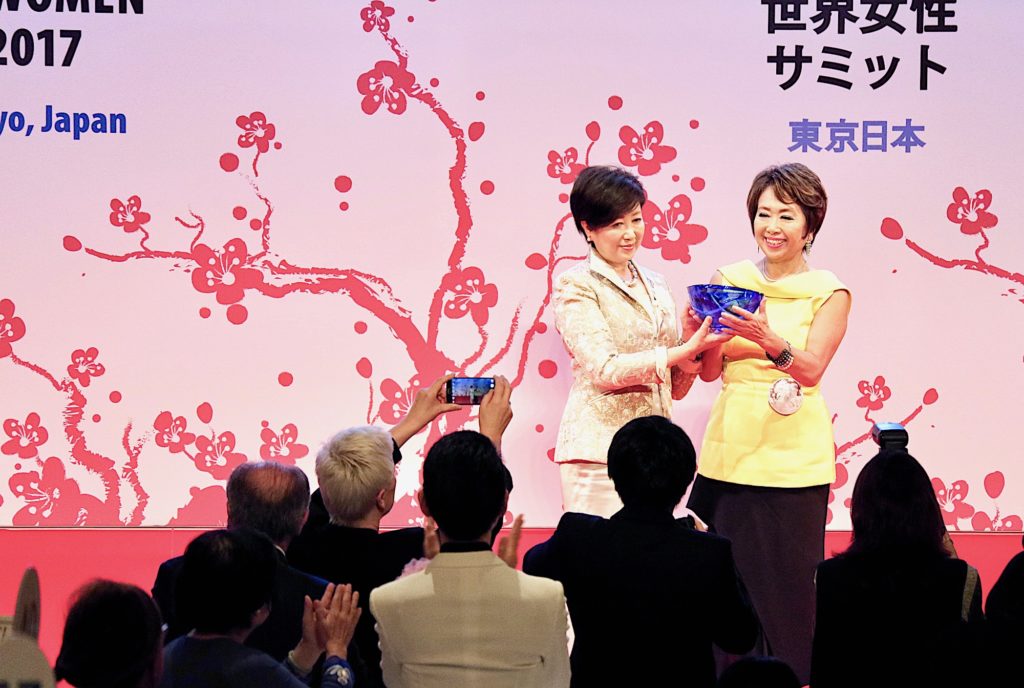
Chair of the Tokyo host committee Noriko Nakamura (right) awards the Japan Women’s Leadership Award to Tokyo governor Yuriko Koike (left) on May 12, 2017.
During the nearly one year since Koike’s election last July, she has aggressively focused on the increase of daycare facilities and daycare staff’s salaries, and on significantly reducing the number of taiki jido — children on the waiting list for daycare. She has implemented a ¥138.1 billion budget — the largest ever — for fiscal 2017 to tackle daycare issues and has set up a goal of zero taiki jido by the end of fiscal 2019. During the two times she appeared on stage during the summit, she openly spoke about the major steps that Japan has to still address toward a real implementation of women empowerment. “Women’s power is not well utilized in Japan,” she said. “It’s a shame … female participation in politics is very small.” “I’d like to remove the burdens women have, not only materially but also (through a change of) the mindset, the mindset of the traditional old-fashioned stubborn Japanese men — this is what I’m challenging right now. Some people say this is a glass ceiling.” Koike’s award, as well as this of Banda invited applause from the audience, in recognition of the two women who have fought to break the status quo in their own countries. Banda, a longtime advocate for female representation in politics, was the second female president of the African country and has been at the forefront of the fight for equal rights for decades.
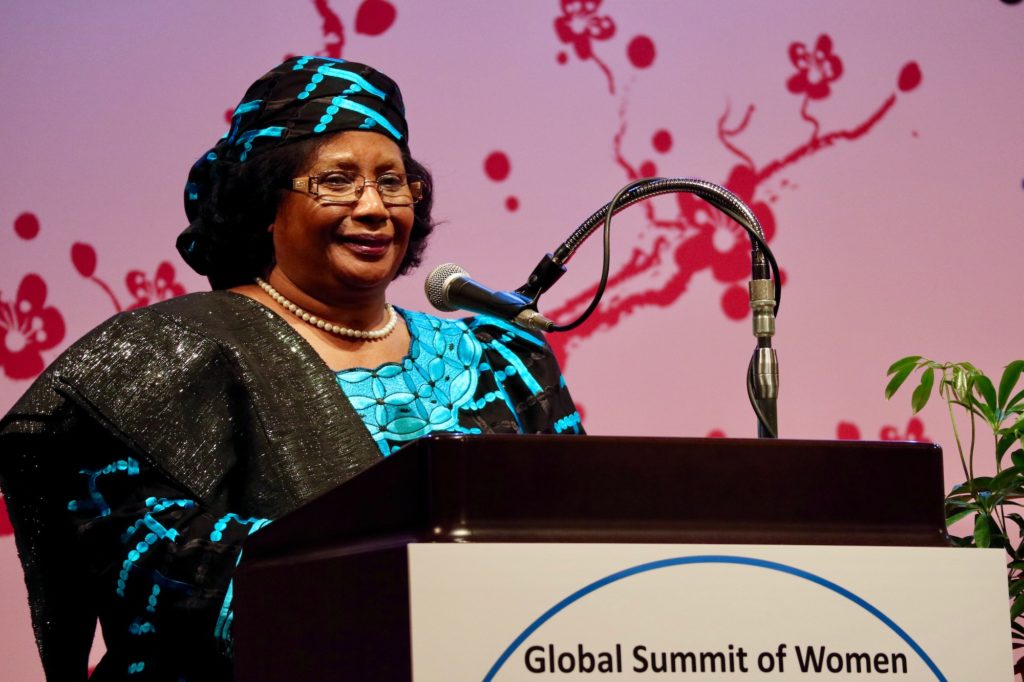
Joyce Banda speaks at the Global Summit of Women in Tokyo shortly after she was awarded the summit’s Global Women’s Leadership Award on May 12, 2017.
Role Models For Future Generations
One of the major highlights of the summit was the invitation of 200 female students from various Japanese universities who took active part in a number of discussions throughout the event. One of the most influential ones was the Youth Forum on May 12, which introduced three young women working in leading positions at startup companies in Australia, France and Japan. The speakers were Marita Cheng, founder and CEO of 2MarRobotics in Australia, a company which created a robotic arm for disabled people; Evelyne Raby, COO of Cybelangel, a French cybersecurity startup founded in 2013, a company that helps major international companies detect data leaks on the Internet; and Chika Tsunoda, founder and CEO of Anytimes Inc., a skill-sharing service platform, a company she founded at the age of 28. The three shared the process of founding their companies and offered practical tips for fundraising, promotion and know-hows of company operation. The students in the audience were clearly inspired, and many were quick to follow up with how-to questions on starting one’s own company or climbing the ladder in a male-dominated corporate world.
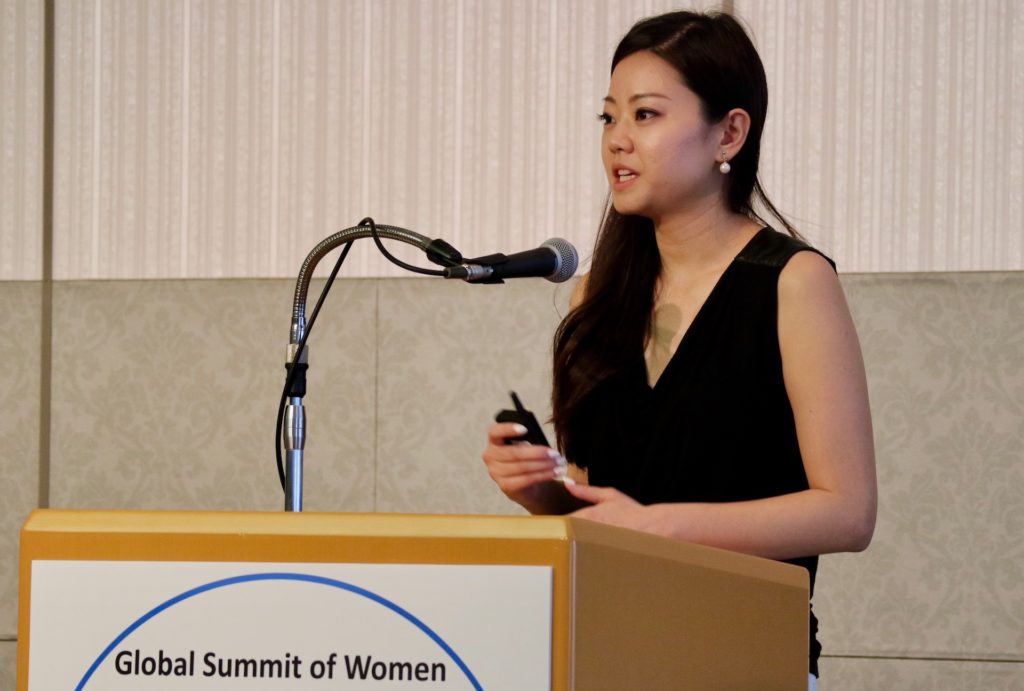
Chika Tsunoda, founder and CEO of Anytimes Inc., speaks at the Global Summit of Women’s Youth Forum on May 12, 2017.
Throughout the event there were a total of 24 discussion sessions, excluding networking breakfasts and dinners, and all students actively attended. The speeches focused on various topics and most included at least one Japanese speaker: from doing business with Japan, women entrepreneurs forums, building your personal brand, recovering from business setbacks, accelerating women’s access to board seats, re-defying a balanced work/life, accelerating women’s corporate leadership, building collaborations with men, equalizing the pay gap, and more. The topics of all sessions addressed something all women joining the workforce soon — or building their companies — will face, and equipped them with ideas and practical means on how to deal with them.
We need to eradicate the stereotypes we have created through publicity, through media, through advertising.
Changing The Public Mindset
A constant topic throughout all panel discussions and speeches was the need to change the society’s mindset about gender roles, a topic that Japan (and certainly many other countries) still struggles to acknowledge in its society. “One of the three ways France is changing this is by tackling stereotypes: the idea that business is for men,” said Muriel Penicaud, the CEO of Business France and the Ambassador for International Investment in her opening remarks to the “Accelerating Entrepreneurship” forum, which also included Emiko Sasaki from Ernst & Young Shinnihon LLC Japan and Haruka Mera, the CEO and founder of ReadyFor, a crowdfunding platform, and which was moderated by Kumi Sato, President and CEO of Cosmo Japan. The discussion was also enforced in the “Reaching Women Effectively as a Market” forum on May 13, in which Mercedes Erra, the founder and executive president of Havas Worldwide, a French-based multinational advertising and public relations company, said that we all carry the responsibility of educating our children in a way that will break boundaries and make true change. “We need to be careful how we educate our children. We have raised (our daughters) thinking they only have half of the rights of the boys. We need to eradicate the stereotypes we have created through publicity, through media, through advertising,” she enforced in a message to all politicians in the room.
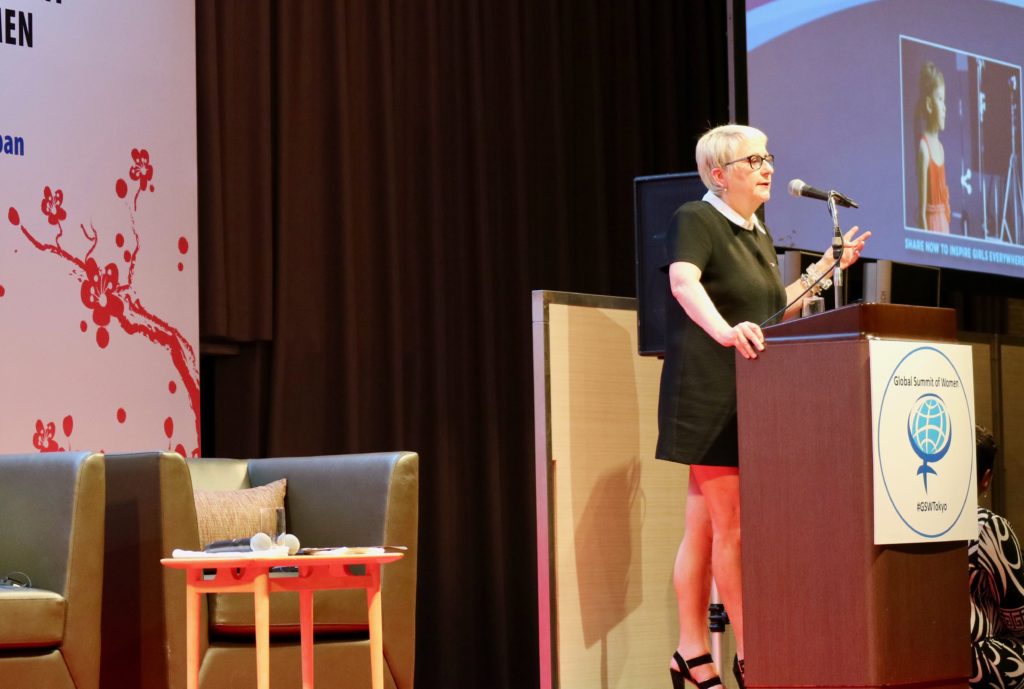
Mercedes Erra, founder and executive president of Havas, addresses the audience of the importance of children’s education toward achieving a true gender equality on May 13, 2017, the last day of the summit.
But it’s also essential to educate our boys to treat women as their equals; to expect equal care from their mothers and their fathers, and raise them into men who will bring equality in their homes and businesses. It was a breath of fresh air when a man rose his hand after the speech and said, “I want to raise my son into a man my daughter would marry.” Like in the ad below, which was shown in the same session.
Savvy Says…
The Global Summit of Women was not ideal. It could have incorporated working mother’s forums; members of women’s labor unions, workers at daycare centers and unemployment offices who tackle cases, including single mothers’ unemployment and other factors. It could have addressed issues Japanese women still face in 2017, such as their inability to choose their surname upon marriage, or have a child within six months after a divorce — or why Japan is not ready to welcome a crown princess, something that Abe and his cabinet are vocally against of.
But it opened a door for discussion and put Japan at the frontline of vocally addressing issues that prevent women from making a choice and finding opportunities to meet their needs. It put the government in the spotlight, making sure that the world is watching and the country can’t continue providing shameful results on international gender gap surveys. It also inspired young women in the audience to know that they shouldn’t be held back and that there are other women who have taken initiatives to take control of their lives. The event was just a beginning — but just like the women’s marches across the globe and just like the election of Governor Koike, we believe it serves as an example of not being afraid to unite and share our voice — whether one is a woman or a man.












